When loss happens suddenly, it hits differently. There’s no preparation, no long goodbye, and no time to process the reality of it before you’re asked to stand up and speak.
Quick Resource
Eulogy Generator
https://eulogygenerator.com/
A guided writing tool designed for moments like sudden loss—helping you organize memories, choose the right tone, and create a eulogy when your mind feels frozen.
If you are staring at a blank page feeling completely paralyzed, please know that you aren’t alone. The shock can make the simple act of organizing a sentence feel like climbing a mountain. This guide isn’t about writing a “perfect” speech—it’s about finding a way to get the words out, honor your person, and survive the delivery.
The Emotional Challenges of Sudden Loss
Why Your Brain Feels “Frozen”
Sudden loss leaves you in a state of emotional whiplash. You might sit down to write and find that your mind just goes blank. That isn’t a failure on your part; it’s a trauma response.
The best way to bypass that paralysis is to lower the bar. Don’t try to write the whole speech at once. Just jot down fragmented ideas, memories, or single words. Scribble them on a napkin or type them into your notes app. If you can’t do that, talk to someone else. Often, just speaking with others who knew them helps untangle the knot in your chest. If you need a bit more structure because your brain feels foggy, we have a guide specifically on crafting a eulogy for sudden loss that breaks it down step-by-step.
It helps to remember that others have walked this road. Take Alex Ostebo, for example. She lost her sister, Denali, unexpectedly in 2023. Alex had to figure out how to turn a Maid of Honor speech into a eulogy overnight. It was heartbreaking, but she found that the actual act of writing became a survival mechanism—a way to channel the grief into something tangible. You can read her full story on Mamamia.
If your thoughts feel scattered and writing feels impossible,
the Eulogy Generator can help you organize memories into words:
https://eulogygenerator.com/
The Fear of Breaking Down
Let’s be honest about the biggest fear: crying in front of everyone. You might worry you’ll stumble or not be able to finish. That fear is valid, but here is the truth: Your audience isn’t looking for a polished orator. They are looking for sincerity.
If you cry, you cry. If you need to stop, stop. Maria, a woman who had to write a eulogy for her dad after he died suddenly, found that practicing aloud was the only way through. She read her draft over and over until the words felt familiar, which helped her get through the actual service. You can read about Maria’s experience here.
Worried you won’t be able to get through the speech?
Use the Eulogy Generator to create a clear, steady draft you can practice:
https://eulogygenerator.com/
Where to Find the Memories
When you don’t know what to say, look for the evidence of their life. Instead of trying to recall facts from memory, try these techniques:
- Scroll back through photos and social media: Look through albums and posts to find moments that highlight personality traits or joyful occasions. What was the last thing you joked about? What photos capture their real smile?
- Ask the room: Ask family and friends for anecdotes that capture the deceased’s essence. Sometimes hearing a story you didn’t know can spark the best inspiration.
- Check journals or letters: Review writings or letters left behind for additional insights into their thoughts and character.
If you’re struggling to recall what to include,
the Eulogy Generator uses prompts to gently surface meaningful memories:
https://eulogygenerator.com/
Writing a Tribute That Resonates
Striking the Right Tone
There is often a temptation to over-explain the death, especially when it’s sudden. It’s natural to want to make sense of what happened. However, a eulogy is usually better served by focusing on the life, not the end of it.
Acknowledge the shock—it’s the elephant in the room—but try to pivot toward the joy they brought. For example, when Dan Smith, a leader in homeland security, passed away unexpectedly, his peers didn’t dwell on the tragedy of the loss. They focused on his service and his legacy. You can see how they handled it on Homeland Security Today.
Consider the example of a tribute written for a young woman named Amy Davis. She loved the ocean. Instead of focusing on the tragedy of her sudden departure, the memorial focused on her love for nature. Her family used candles and a bonfire to reflect her passions, keeping the focus on her light rather than the darkness of the loss. If you are struggling to find the words to shift from sadness to celebration, sometimes borrowing uplifting funeral quotes can help bridge that gap.
Ditch the Timeline, Tell a Story
Chronological biographies (“He was born in 1960, then he went to school…”) can feel a bit dry. Instead, try organizing your speech around themes.
- Was he funny? Tell a story about his mischievous laughter or that one joke he told at every holiday.
- Was she resilient? Share a memory of a time she overcame something difficult, inspiring others along the way.
- Were they generous? Talk about the time they stopped to help a stranger or gave back to the community.
Pick two or three good stories that prove these traits. It’s much more powerful to show who they were than to just list their qualities.
Need help turning stories into a cohesive tribute?
The Eulogy Generator helps structure themes instead of timelines:
https://eulogygenerator.com/
Creating a Strong Conclusion
End your eulogy with a takeaway message. Share how the person’s life continues to inspire you or others, or reflect on the positive impact they had on the world. This leaves the audience with a feeling of connection rather than just finality.

Delivering the Speech with Confidence
Prepare Your Body
Public speaking is physical. When you are grieving, your breath gets shallow. Before you walk up to speak, take a few deep breaths. Inhale for four seconds, hold it, and let it out slow. It sounds basic, but it physically resets your nervous system.
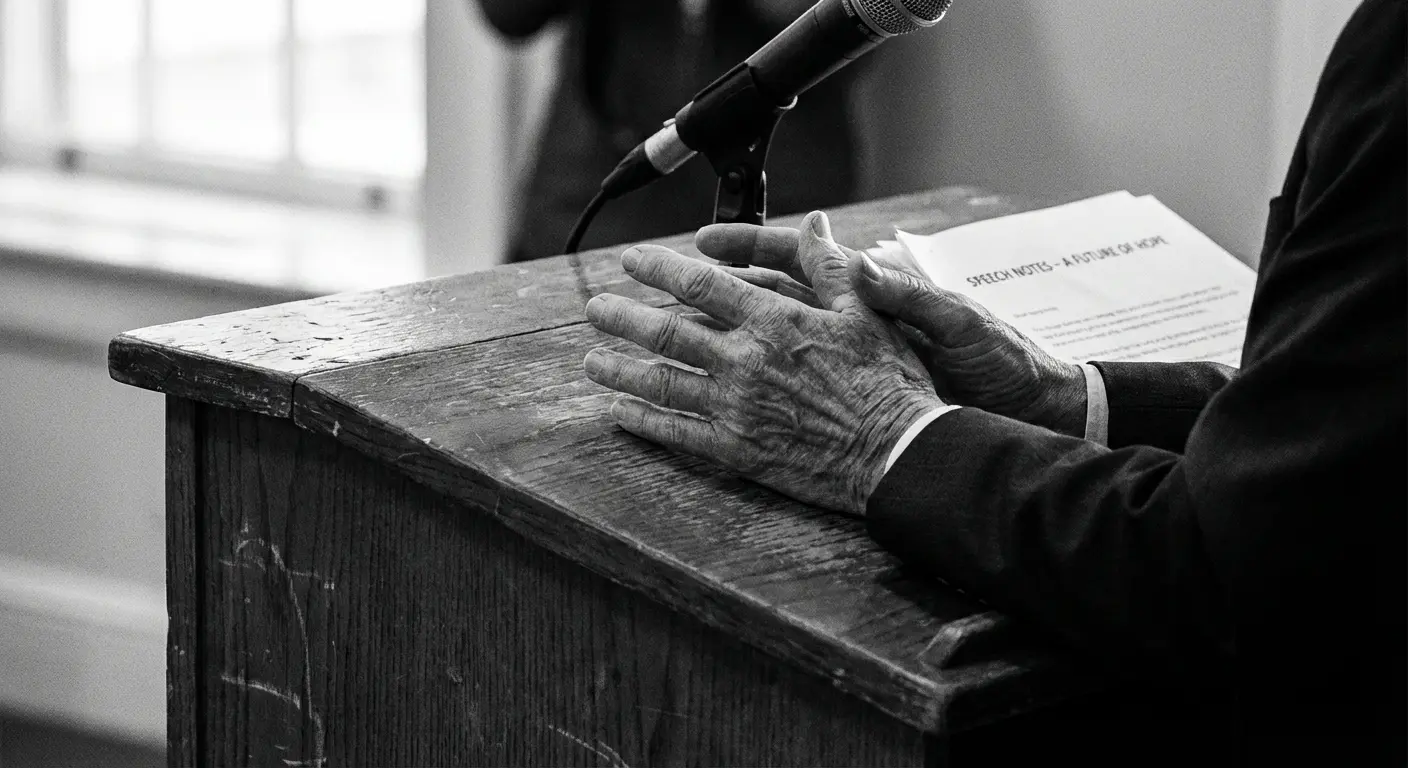
And remember: Accept imperfection. You don’t need to be perfect. You just need to be real. Your audience understands the emotional weight of the moment.
Pro Tip: Read your eulogy out loud at least five times before the service. This ensures your mouth knows where it’s going even if your brain shuts down from emotion. Source: Eulogy Generator.
Connect With the Room
Try to pick stories that everyone can relate to. If you tell an inside joke that only two people understand, you might lose the room. But if you talk about how much he loved his dog, or how she could never cook a meal without burning the toast, everyone nods and smiles. That shared recognition is comforting.
If you need inspiration on how to keep things brief but impactful, looking at short eulogy examples can help you see how others have done it.
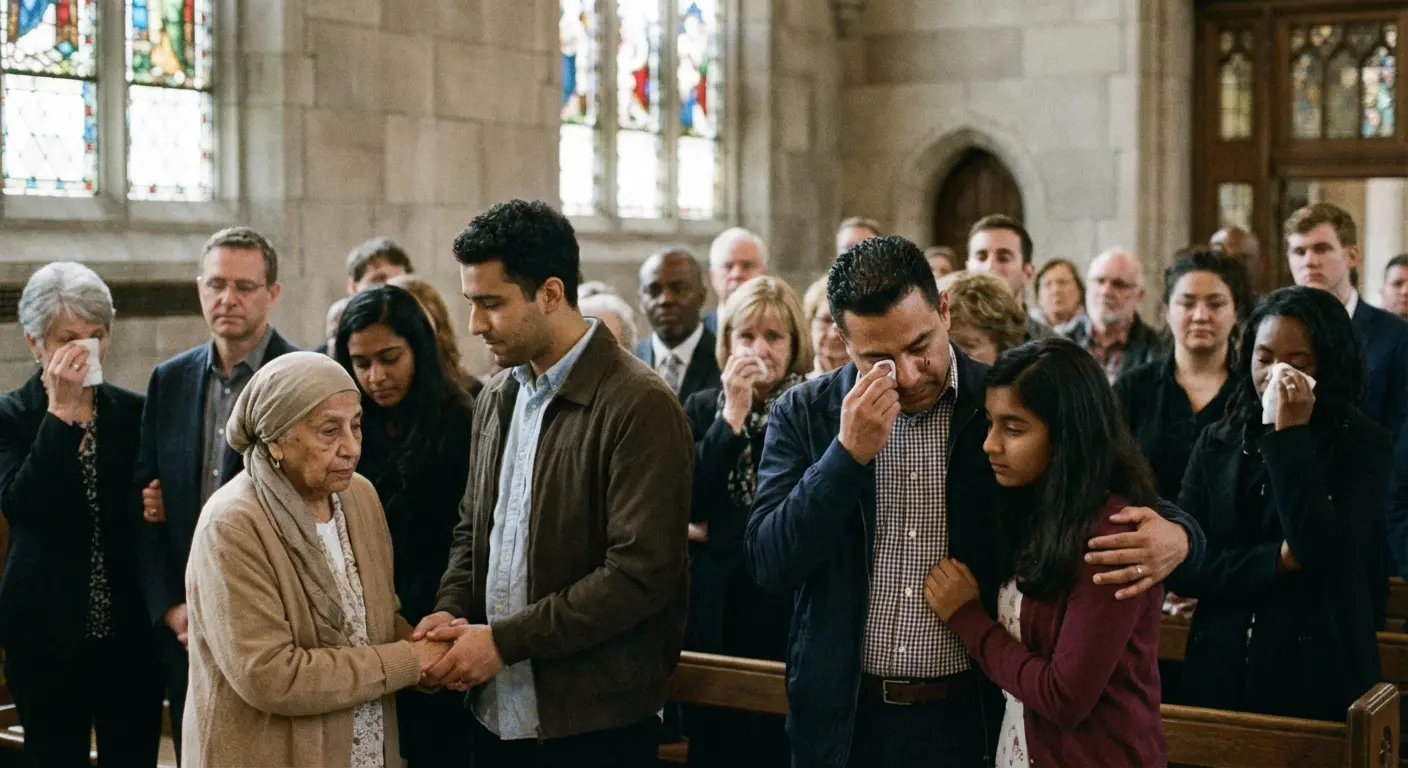
A touch of humor can also lighten the mood and offer warmth, but use it sparingly and with sensitivity. Choose moments that reflect the deceased’s personality without detracting from the overall tone.
Tailoring it to the Relationship
For a Parent
When writing a eulogy for your dad or mom, focus on the lessons they left behind. You are speaking not just for yourself, but often for the whole family. It’s okay to acknowledge the hole they have left in the family structure—honoring that void is part of honoring them. A well-crafted eulogy for dad honors his role as a protector and provider.
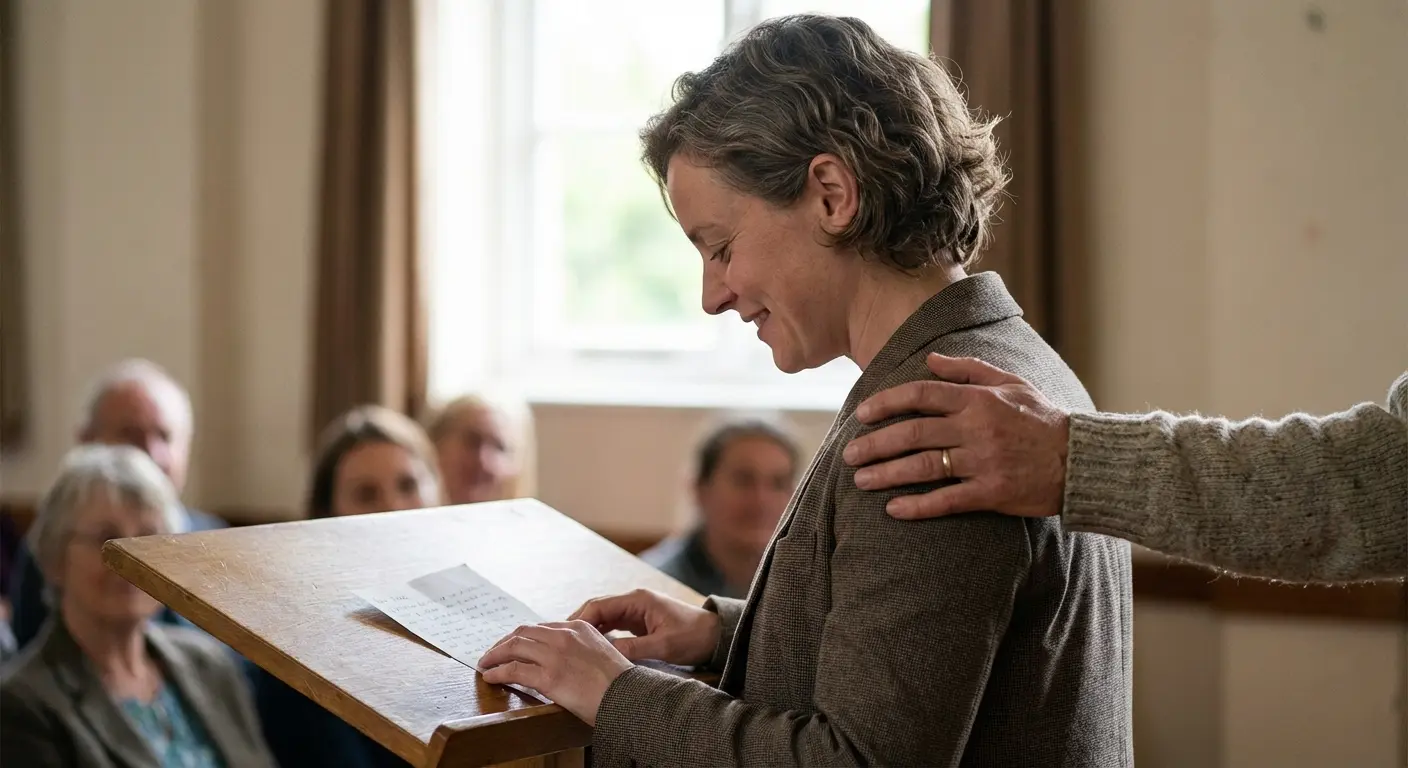
For a Friend
Friends are the family we choose. When Peter Woolley wrote a eulogy for his best friend Keith McCready, he didn’t scrub the speech clean. He talked about their “epic monthly trips” and childhood mischief. He captured his friend’s “larger than life” personality. Don’t be afraid to share the adventures. Read the full tribute here.
For a Colleague
Focus on the work, but more importantly, focus on the person at work. Did they mentor people? Did they make the breakroom bearable? Highlight the camaraderie they built and the achievements they shared.
Whether you’re writing for a parent, friend, or colleague,
the Eulogy Generator adapts to the relationship automatically:
https://eulogygenerator.com/
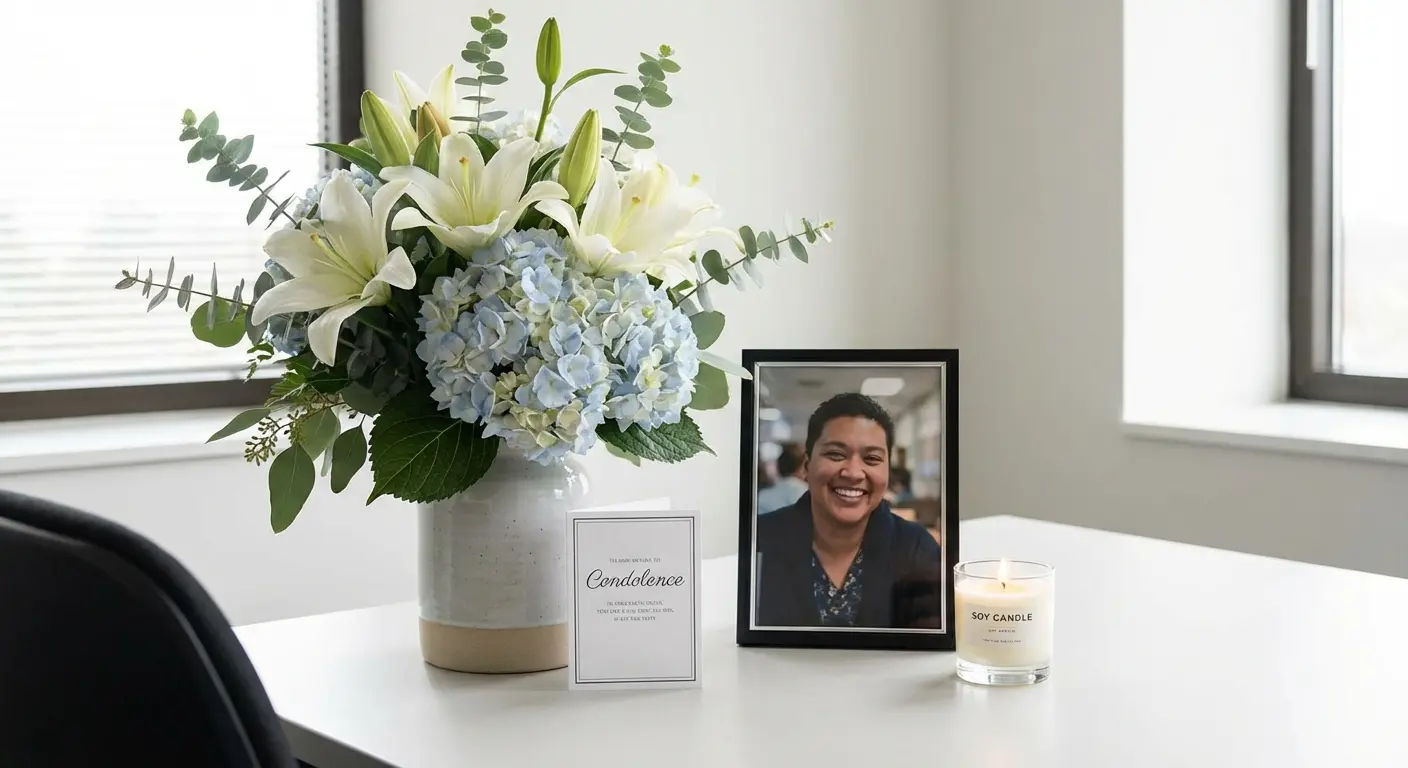
If You’re Just Too Overwhelmed…
Sometimes, the grief is just too heavy to be creative. That is completely valid. If you are staring at the screen and nothing is coming, we built the Eulogy Generator to help with exactly this.
It’s not about letting a computer write your feelings; it’s about getting a helping hand to organize the chaos in your head. We offer prompts to help jog your memory and templates to give you a structure so you aren’t starting from zero. Our comprehensive eulogy writing guide breaks down the task into manageable steps to ease the burden.
A gentle way to write: Try the “24-Hour Method.” Write in 30-minute chunks, then take a 15-minute break to cry, call a friend, or just stare at the wall. Be patient with yourself.
Steps for Using the Eulogy Generator:
- Start with memory collection prompts.
- Select a template based on the relationship (parent, friend, colleague, etc.).
- Add personal anecdotes and key themes.
- Refine your draft with unlimited revision options.
- Practice your eulogy using provided delivery tips.
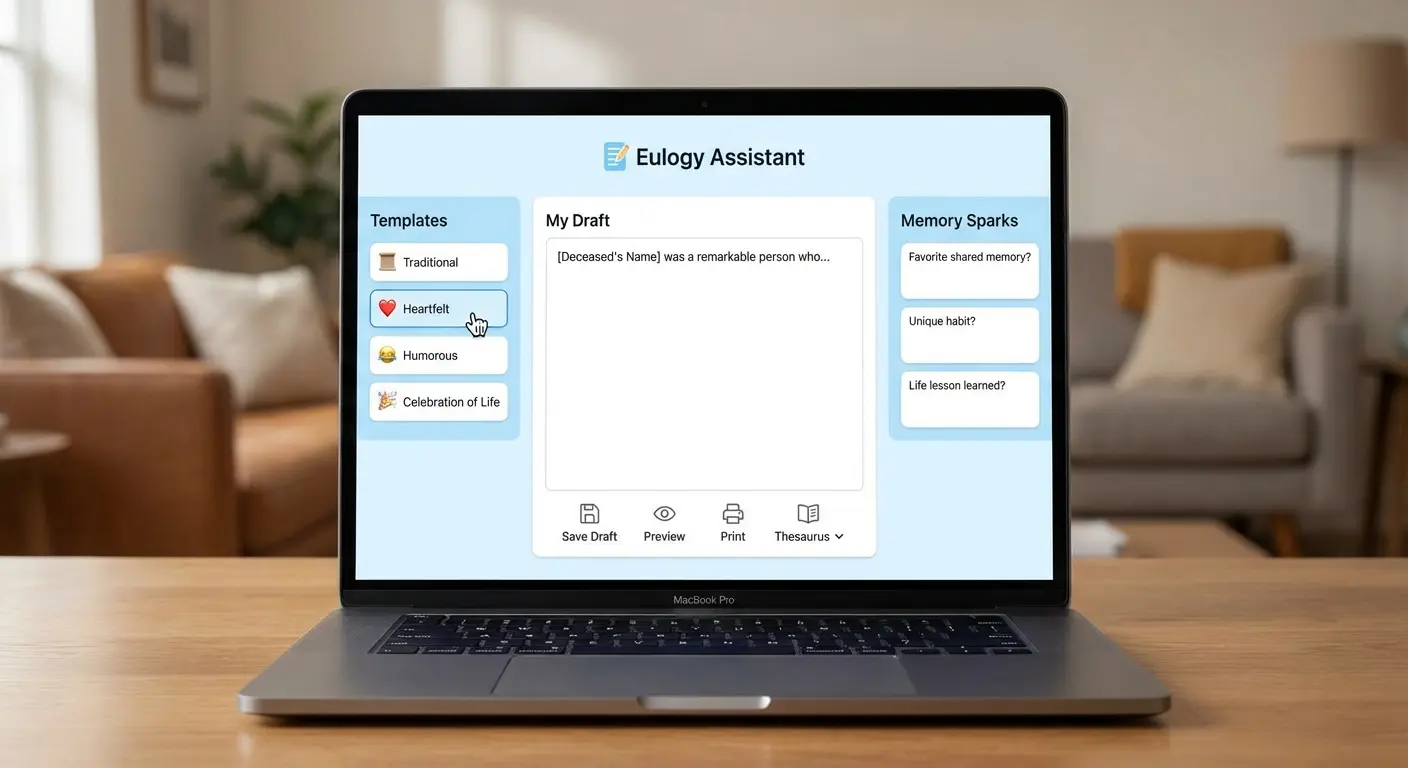
Features Designed for Emotional Support
Grief-Aware Prompts
The platform gently guides you through memory collection, offering questions that help you reflect without becoming emotionally overwhelmed.

Unlimited Revision Options
You can refine your eulogy as much as needed, ensuring it accurately reflects your emotions and memories. Before you finalize it, run through a quick mental checklist:
- Have I practiced reading it aloud 5 times?
- Did I include a specific, joyful memory?
- Is the tone balanced between grief and celebration?
- Have I timed the speech to ensure it isn’t too long?
When grief makes starting feel impossible,
let the Eulogy Generator help you take the first step:
https://eulogygenerator.com/
Final Thoughts
Writing a eulogy for sudden loss is one of the hardest things you will ever do. But it’s also a final act of love. It’s an opportunity to honor your loved one’s life while finding healing and connection through shared memories.
Susan Dugdale, a drama teacher with 40 years of experience, always reminds people that with the right guidance, anyone can speak with power—even when their voice is shaking.
Take a breath. You can do this. And if you need help starting, Eulogy Generator is here to help you find the words and craft a tribute that honors your loved one’s legacy.


